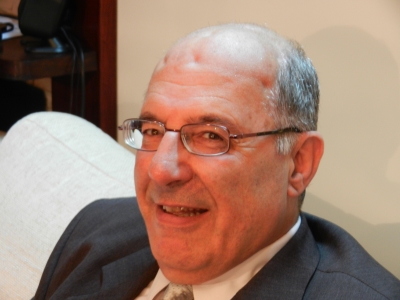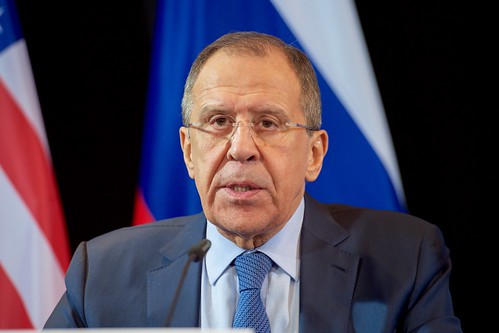A cleverly concocted diplomatic scandal is shaking up the political scene in Bosnia and more widely in the Balkans. A presumably purloined 17th century Orthodox icon presented to Foreign Minister Lavrov by Milorad Dodik, Serbian member of the Bosnian Presidency and its current rotating chairman, thus technically Bosnia's chief of state during the current six-month period, is suspected to have been acquired by questionable means. To make this diplomatic witches' brew even more poisonous, there are suggestions that it has links to a notoriously problematic cauldron - the Ukraine.
In response to these unsettling revelations, the Russian Foreign Ministry very decorously announced that it was returning the icon so that Interpol might conduct an investigation into its origin.
The multi-layered scandal has the potential to muddy not just diplomatic relations, but also generate distrust between churches within the Orthodox world and, no less importantly, to undercut relations between the Serbian and Russian nations. A quick cui bono? question yields perfectly obvious answers, and they all point westward. Posing the more fundamental question of who might be the organizers of this unsavoury prank also points in only one direction. Suspiciously synchronized with Gen. Sir Nick Carter's (Chief of Britain's Defence Staff) noteworthy statement just days ago that "The way to win is to beat them [the Russians] at their own game, and that means beating them below the threshold of war," the icon incident has the unmistakable fingerprints of Perfidious Albion. With all due respect for the trans-Atlantic acolytes, it was just too sophisticated for them to pull off.
What happened, essentially, is that as part of his Balkan tour Foreign Minister Sergei Lavrov paid a visit to Bosnia and Herzegovina several days ago. His host there was Milorad Dodik, the long-time Premier and President of the Republic of Srpska, the Serbian half of the country, and currently the Serbian member of its three-man rotating Presidency. The circumstances underlying the Russian foreign minister's visit to Bosnia are serious enough. The entire political and propaganda apparatus of the West, where Bosnia is concerned, is monomaniacally focused on a single issue: the restructuring of the Dayton Agreement by which the war was ended in 1995. The Agreement, at the time acceptable to all three sides and which continues to be acceptable to the Serbs, provides for a loosely confederated country of three constituent peoples and two political entities. While at the time this formula was reached in 1995 it suited the collective West's momentary purposes as well, it no longer does. The Drang nach Osten, which no one is any longer even bothering to conceal, requires the same strategic preparations that impelled Hitler in 1941 to secure his Balkan rear. That means that Balkan statelets must be brought safely with the aggressor's camp, or at least be reliably neutralized.
The joint military exercises scheduled to soon take place with the participation of units of Serbian and Bosnian armed forces are a case in point. In the Bosnian Defense Ministry announcement, the exercises are represented as designed to "promote bilateral relations and regional cooperation," along with a plethora of all the other usual platitudes. But the key point is that their purpose was revealed to be to "implement the concept of 'Operational Capability Concept Evaluation and Feedback,'" the phrase in quotation marks being as cited, in English, in the original local language document. And, significantly, we learn that, strangely, these military exercises of two technically neutral and non-NATO countries will be conducted to test their "operational capabilities according to NATO standards." What for, one may ask.
That is the broader context within which the diplomatic scandal involving the icon (by all appearances of St Nicholas, who is conveniently celebrated according to the Orthodox calendar on December 19, another nice and thoughtful British touch) was ignited.
But the even broader context is the relentless drive for the annulment of the irksome Serb entity Republic of Srpska, whose firm insistence on friendship with Russia and scrupulous observance of the Dayton accords, including the power to veto federal policies it disapproves (such as joining NATO) because they are contrary to its national interest, are an insurmountable roadblock which can only be removed by achieving its destruction.
Granted, President Dodik was not an art major nor is he a known art connoisseur, but perhaps he should have taken a closer look at the gift with which he intended to honor Mr. Lavrov. Had he done so, perhaps he would have noticed the seal on its back, in the Cyrillic alphabet that he is perfectly capable of reading, suggesting that the gift item may have some links to the Ukraine, and that should have put him on alert. But it is all water under the bridge now.
As in the MH 17 case over the Donbas and the sordid Skripal and Navalny affairs, the pre-packaged spins were activated with lightning speed to speedily impose the perpetrators' false narrative. The opposition PDP party, a local Bosnian asset of the formidable agency perched at Vauxhall Cross in London, demanded on cue Dodik's resignation for "shaming" the Republic of Srpska with the negligence he so wantonly displayed. Another bought and paid for asset, the formerly patriotic BN radio and television network which had since switched sides, chimed in with the conspiracy theory that Russia was pushing Dodik under the bus and that it was Russian operatives who suggested this particular item as the most suitable gift for Lavrov precisely to grease the skids for his downfall. One of the more imbecilic conspiracy theories making rounds these days, indeed.
Last but not least, it was hardly conceivable that Ukraine should be involved in this affair without committing a tell-tale gaffe reflecting once more (think back to the initial stages of MH17) the comical professional incompetence of its special services and suggesting a high level of probability of guilty foreknowledge. The Ukrainian Embassy in Sarajevo was too impatient to sleep on it, as we say in America, so it officially demanded from the Bosnian Foreign Ministry the icon's repatriation the same night that the scandal broke. That was, of course, as we also say in America, jumping the gun before any firm evidence was at hand or any forensic investigations could have been conducted, and at a time when no reasonable conclusions could be drawn.
As if that were insufficient evidence of a set-up, it should also be recalled that Dodik's colleagues in the Bosnian Presidency, Ã... efik DÃ... ¾aferoviÄ"¡ and Ã... ½eljko KomÃ... ¡iÄ"¡ refused to abide by their protocolary obligation to co-host minister Lavrov upon his arrival in Sarajevo, citing the most specious of reasons. Assuredly that was because they were part of the plot and their assignment was to make sure that all the blame fell on the Serbian member of the collective body and on the Republic of Srpska that he represents.
The striking implementation of Sir Nick's "under the threshold" doctrine via the icon affair will not be a mortal blow either to the Republic of Srpska or the political fortunes of Milorad Dodik. But for the moment, at least, it casts a shadow on both as most likely was its entire original purpose, to undermine their capability to resist the ferocious pressure that is being constantly ramped up to replace the Dayton Agreement autonomy with a unitary NATO appendage state.






